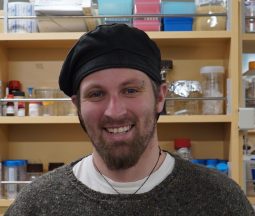Duncan McMillan

2016: Dr Duncan McMillan, University of Canterbury, Department of Applied Chemistry, has been awarded a Rutherford Discovery Fellowship for research entitled: 'Biomembrane nanotechnologies for exploring pathogen respiratory adaptation to identify and develop novel antibiotics'.
Biography
Dr Duncan McMillan is a multidisciplinary scientist who studies membrane bioenergetics and currently holds an Assistant Professorship at The University of Tokyo. His PhD at the University of Otago focused on extremophilic bacterial adaptions to make energy. Due to the complexity of the membrane-bound bioenergetic systems involved he realized that new technologies were required. Since then he moved to the University of Leeds (UK) to study biophysical approaches such as bioelectrochemistry, artificial membranes architectures and single-molecule microscopy. Then to Friedrich-Schiller University (Germany), and most recently to The University of Tokyo (Japan) to take up a long-term JSPS international fellowship where he to studied single-molecule microscopy of the ATP synthase – nature’s smallest molecular motor. In conducting these studies he realized that these novel platforms used in this study represent a broad-spectrum toolbox which can be applied to the study of bioenergetics of all life, from inhibitor development for pathogens and methane-generating ruminant organisms, to energy capture by plant photosystems and understanding mechanisms of microbes to aid in bioremediation of industrial waste sites.
Research summary
The golden age of antibiotics and vaccination has seen a vast reduction in the morbidity and mortality caused by pathogenic microbes. But this time of relative safety has come to an end due to overuse, and the growing threat of antibiotic resistance is widely recognized, with cases now common in New Zealand and the Asia-pacific area. When a pathogen infects its host, the environment changes for the pathogen, and it is essential for survival that it adapts its method of generating energy (i.e. its use of ‘respiratory enzymes’ – the engine-room supporting pathogen life). Respiratory adaptation occurs at the cell membrane, where the cell meets the environment. Given the essential nature of respiratory enzymes for life, and the unique nature of some microbial enzymes, they are ideal targets to inhibit pathogen growth. However, the functions of such enzyme systems as a whole are poorly understood in their native membrane environment. Furthermore, the rapid rate of bacterial adaptation to environment has not been met by scientific innovation. Classical techniques rely on the study of isolated enzymes in solution with the cell membrane itself being ignored. Non-native, water-soluble forms of the substrates of these enzymes are often used out of biological context, leading to inconsistencies between laboratory data and down-stream clinical observations.
During the tenure of this fellowship Dr McMillan will be using novel macro- and nano-artificial membrane methodologies together with bioelectrochemistry to study respiratory enzymes in a native membrane environment. These techniques will identify the fundamental mechanisms of how pathogens are able to gain energy for growth under various physiological conditions, and the complex interplay of the many enzymes associated with this process. This understanding will enable the development of a ‘in membrane’ screen for inhibitors of respiratory enzymes known to be essential for pathogenesis by analyzing the whole respiratory system in its native state.
